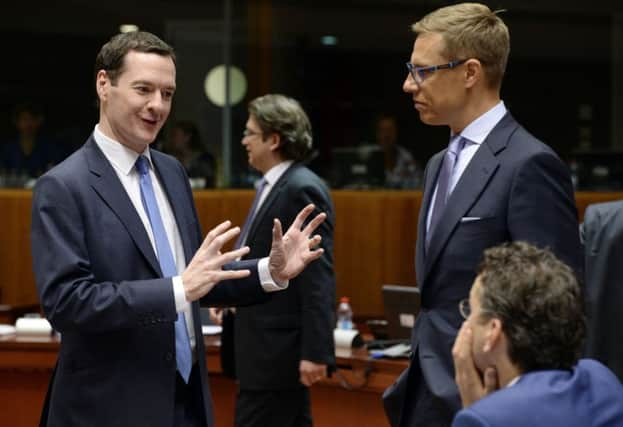Brian Monteith: Osborne didn’t budget for bad week


If George Osborne is what the future Conservative Party looks like then it is heading for a big fall. That is my reluctantly pessimistic conclusion after another poor week for the Chancellor.
First we had the too-clever-by-half Budget that was a golden opportunity missed and now we have had his failure to prevent the UK underwriting a Eurozone debt that has nothing to do us.
Advertisement
Hide AdAdvertisement
Hide AdOsborne’s blend of blue Labour policies coupled with the denial of economic and political reality is a recipe for hubris on a grand scale.


If the Budget wheeze of introducing a higher minimum wage than promised by Labour is thought to have worked then why not go further and adopt more of its failed interventionist doctrine – why not have a full-scale prices and incomes policy? Never mind Ed Miliband’s energy price freeze (that became meaningless when prices started to fall late last year) why not start fixing the price of groceries? David Cameron and George Osborne are not so much the heirs to Harold MacMillan as they are to Edward Heath and Anthony Barber. And remember where they took the Conservative Party.
Thankfully some voices in business are beginning to be heard warning about the real dangers of where Osborne is taking us. Hugh Andrew, proprietor of Birlinn, Scotland’s largest independent publisher, and Robert Kilgour, a successful serial entrepreneur employing more than 300 workers in Scotland’s care sector, have both warned how the hourly rate-hike risks dangerous unintended consequences. Andrew has pointed to how higher-paid employees will seek to maintain differentials, placing pressure on all other pay scales, while Kilgour has pointed to how public sector contracts have not been uprated to fund the enforced pay increase.
Pressure on pay differentials will most likely result in wage inflation that will be paid for in lost jobs or higher prices rather than the elusive improvement in productivity. It also means that while at least 20 per cent of workers will have their wage rates set in statute, the government must have a consequent influence on practically all other salaried staff who will also look to retain their incremental improvement. This is not modern capitalism but 70s-style corporatism with all its rigidities that failed us before.
When politicians call on the private sector to pay a living wage it is most often empty rhetoric, for its is rarely matched by governments or councils raising the payments to private employers for the now more costly services. Who will pay the rise in minimum wages for private sector care workers delivering services to councils, asked Kilgour. Legislating for pay increases must deliver an as yet unbudgeted call on public finances for either the up-rating of privatised contracts or, more likely, the resulting increase in welfare payments due to those becoming unemployed.
All of these likely economic consequences are just beginning to dawn on Conservative politicians and the initial smiles at outfoxing Labour are wearing thin. The UK economy is not out of the woods yet and could still face significant trouble from any number of lateral shocks. The real test will be how it reacts to an eventual interest rate rise, for they cannot remain at this historic low forever. Then what? If it leads to job losses what value then for the National Living Wage? The estimate of 60,000 fewer jobs as a direct result of Osborne’s great wheeze by the Office Budget of Responsibility will be as unreliable and meaningless as SNP oil price predictions.
While the ramifications of the budget were beginning to sink in Osborne then had the task of reassuring us that British taxpayers’ money would not support the latest deal to save the Greek economy. It had been claimed that an agreement was secured in 2010 by Osborne to prevent any UK funds being used, but this has simply been brushed aside.
At the moment it is all imaginary money, for the funding comes from the European Financial Stabilisation Mechanism which has some €12 billion (£8.3bn) at its disposal. But if Greece defaults on paying this temporary loan back then the loss has to be covered by payments from all EU members. As City expert Bob Lyddon’s research for Global Britain revealed last week, the liability is joint and several, meaning the UK cannot avoid contributing and is exposed to greater risk than just its ordinary share. If there is contagion to other countries from a Greek default – and that is a real danger – then the UK would also become liable to bail out the share not paid by, say, Portugal or Spain, or Italy or even France.
Advertisement
Hide AdAdvertisement
Hide AdOsborne tried to make light of his personal embarrassment by faking a victory, saying he had agreed an “impregnable ringfence”, but this is as valueless as his 2010 agreement. If default leads to a bill the UK must be faced by at least its share (£850 million), but probably more. The only way that non-eurozone countries can expect to be protected from the risks of the euro is for EU treaty changes to absolve them of it. Unconstitutional protocols or worthless assurances cannot ringfence the UK.
The EU leadership’s dismissal of George Osborne’s demands and his response of defending the indefensible tells us three things, none of which is good for the Chancellor. We now know that the previous deal by Osborne has been worthless and that we must treat all future agreements with the EU with sceptical caution; we know that Osborne will attempt to bluff his way out of diplomatic failure and must therefore expect more bluster from him in his role as David Cameron’s chief negotiator for EU reforms; and, we know when a Conservative leadership election comes, as it must within five years, that Osborne will be the Europhile candidate.
For if, by then, the UK has voted to leave the EU then his career will be over, but if it has voted to stay in then the Greek debacle means there must be treaty change after 2017 to shore-up the euro, provoking a further referendum. EU membership will continue to divide the Conservative Party and George Osborne will be judged on his EU positioning. More EU-sceptical challengers, such as his arch-rival Boris Johnson, know this. For Osborne the holidays cannot come quick enough.